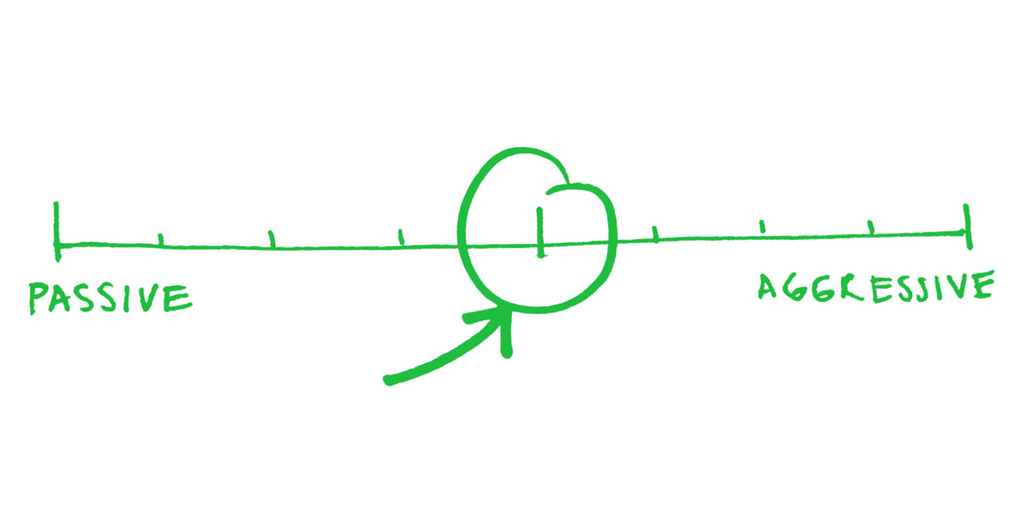Communication tips for empathetic people

One bite of a pasta piece, and I immediately know whether it is perfectly cooked. Al dente. The perfect texture for cooked pasta. The perfect combination. Tender, yet firm.
I think of al dente pasta when I think of an assertive communication style.
Assertiveness is about making your thoughts, needs, and opinions clearly understood. Assertiveness means expressing your point of view clearly and directly. To stand up for yourself and to be perceived as confident and self-assured. The effect? As others see that you respect yourself, they respect and take you more seriously. On the communication scale, it is in the perfect place between being too passive or too aggressive.

I was not familiar with the term assertiveness (English is my second language) until I was working for a couple of years. In my performance review, my manager urged me to be more assertive. It has been a recurring theme ever since in performance reviews, role feedback, personality tests, interview rejection emails… everywhere, always, a regular! I am knowledgeable and collaborative, but being bolder, more decisive, more assured, and coming across as more confident, is something that I’m continuously working on. It is crucial for how others perceive me and polishing off/packaging the knowledge that I already have.
If you are, like me, more on the empathetic and quiet side of the communication scale (I’m an Enneagram Type 9), how do you become more assertive? Do you want to develop a leadership style of being tender yet firm, especially as a female leader? Do you want to stop being perceived as passive and indecisive, and not succinct?
Here are some long-term and short-term strategies that are helping me incorporate assertiveness in my communication and to lead, not only with empathy but also with boldness.
Tips To Improve Assertiveness in the Longer Term
It is a process, and because it is related to your self-confidence, it takes time and work.
1. Understand why you are not assertive.
Dig deeper into why you lack confidence when you share your opinion with the effect that you come across as unclear and indirect. Dig more into why you are so critical of yourself and set such a high standard for yourself with the effect that you come across as hesitant.
It is helpful to understand why, but in the long term, you must not only know why but also do the work to improve it.
I had to dig deep to uncover why I was afraid to share my opinions and ideas in a group. It was influenced by growing up in a strict and critical household. It was my parent’s way or the highway, and there were very high standards. I was so good at following rules but not so much at questioning them or sharing my opinion on them. I also had an underdeveloped chin — which made me feel like something was wrong with me or that I was lacking something — the opposite of bold and confident.
2. Learn about yourself in uncomfortable interactions.
Be curious and reflect on your interactions.
Before an interaction where you feel shy or uncomfortable:
- Check in with how you are feeling.
Don’t jump into the meeting or conversation immediately. Take a moment to check in with how you are feeling and try to connect with yourself. For me, checking in with my feeling while putting both my feet firmly on the floor and facing forward helps me to get in the right frame of mind and feel more grounded and confident. - Ask yourself what you are afraid of.
For me, I am afraid of coming across as not being knowledgeable or competent or uninteresting, that they will find out that I’m lacking. But, here is the funny thing: not saying anything or saying it without assertiveness is more detrimental, making you come across as uneducated. - Prepare, prepare, prepare.
Prepare what you want to say, how you want to be perceived, and how you will be more involved in the interaction and speak up. You must prepare and practice more than others until you appear more confident.
After an interaction:
- Ask yourself what made you feel scared and where you were uncomfortable. Ask yourself what made me feel good and where you were comfortable confidently expressing your opinion.
It was surprising for me to realise how invigorating it feels after sharing my opinion and thoughts, even though it doesn’t come naturally. - Reflect to learn.
Reflect on what you would change if you could do it again. - Be kind to yourself.
If you haven’t been as forceful as you’ve wanted to be, be kind to yourself. It’s a process.
Tips To Increase Assertiveness in the Short Term
This is an extensive and lengthy process of unlearning and re-learning. What can you do in the short term to improve your communication with others?
Fake it ‘till you make it.
You don’t have to be Italian to make perfect al dente pasta! By improving your body language and communicating succinctly, you can give the impression that you are more confident and assertive.
- Use hand gestures to establish trust when communicating, like The Box (to frame your idea), Holding The Ball (to indicate authority and mastery), and The Steeple (to indicate authority when speaking or listening). Watch this video for examples.
- Communicate clearly and watch out for using words that indicate uncertainty, such as I think (I think it will help → I believe it will help), just (I just want to check → I want to check), could (we could look into it → we will look into it), only (the only thing is → the thing is). Read more in this article.
- Refrain from touches that show discomfort or insecurity, for example, touching your ear, your nose, your face, and your hair when you are speaking or listening. This looks like nervousness to others, signaling that you are uncomfortable with the situation, subject matter, or meeting.
By changing your gestures and tweaking your choice of words, people will pay more attention to what you say.
You Can Be Tender Yet Firm.
If you are more on the empathetic, non-assertive side of the communication scale, you can change how you are perceived. It can be improved if you want to have a powerful presence and be seen as a force to be reckoned with.

In the long term, figure out why you are uncertain and hesitant and check in with yourself to learn how to improve — it is a process. In the short term, fake it ’till you make it, with authoritative gestures and clear communication. This will help you will become more assertive. Others will notice what you say, which will slowly and undoubtedly change how your colleagues and your friends perceive you.
If you work on being more assertive, you can be like the perfect pasta dish.
Al dente. Tender yet firm.
🍝 Do you have any recommendations based on your own experience on how to be more assertive? Please share it in the comments.
How to Be a Better Leader by Communicating More Assertively was originally published in Better Programming on Medium, where people are continuing the conversation by highlighting and responding to this story.